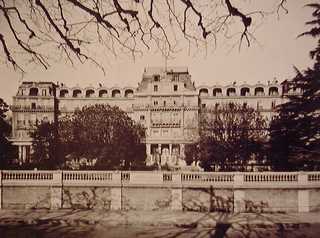The League of Nations
|
|
|
Palais Wilson in Geneva
|
Preceding organizations were the International Telegraphic Union (1865), the Universal Postal Union (1874), the Inter-parliamentary Union (1889) co-founded by William Randall Cremer and Frederic Passy was considered "the first truly international political organization" that sponsored the annual Universal Peace Congress; Tsar Nicholas II convened the first International Peace Conference (1899) at The Hague that adopted the Convention for the Pacific Settlement of International Disputes and established the Permanent Court of Arbitration that began meeting in 1902; the International Women's Congress met at The Hague in 1915, led by Jane Addams of the Women's International League of Peace and Freedom.
1919 - The League of Nations was created by the Versailles Treaty signed by 32 nations June 28 in the Hall of Mirrors at the Versailles palace near Paris.
1920 - On Jan 10, the Treaty of Versailles was officially ratified and the League of Nations came into existence. The League Council held its first meeting in Paris on January 16, but moved to Geneva where the Council began meeting in the Palais Wilson, formerly the Hotel National. The Assembly met November 15 in Geneva in the Salle de la Reformation where 41 states signed the charter. Woodrow Wilson had selected Geneva to be the headquarters because Switzerland was a neutral country, more likely to attract additional members. The League moved to a new building in 1936, the Palais des Nations, with a library contributed by John D. Rockefeller Jr. with a gift of $2 million. The 3 components of the League were the Assembly, the Council, and the Secretariat. The three Secretaries General were Sir James Eric Drummond from Britain (1920-1933), Joseph Avenol from France (1933-1940), and Sean Lester from Ireland (1940-1946). The 4 permanent members of the Council were Britain, France, Italy and Japan, and the 4 non-permanent members were elected by the Assembly every 3 years. On Dec. 21, the League approved the appointment of the Permanent Mandates Commission. 14 mandate territories would be governed by the six mandatory powers of the United Kingdom, France, Belgium, New Zealand, Australia and Japan. The territories were regarded as colonies by the great powers and none gained independence before WWII, with the exception of Iraq. In addition to the Mandates, the League governed the Saarland for 15 years, before it was returned to Germany following a plebiscite, and the free city of Danzig until Sept. 1, 1939.
|
Fridtjof Nansen - explorer
|
1921 - In response to the plight of one million Russian refugees in Europe, the League appointed Fridtjof Nansen of Norway as High Commissioner for Refugees. Nansen created the "Nansen Passport" for refugees giving them limited legal status so they could travel to a foreign country to find work and apply for permanent status. He persuaded 53 nations to agree to an "arrangement" that gave one-year protection to passport holders. Before his death in 1930, he negotiated other "arrangements" that allowed consular officials to protect and help refugees in cooperation with the office of the High Commisioner. These arrangements became the foundation for the Refugee Convention in 1933 and legal protections for groups of refugees. He also began a resettlement effort in 1923 with the help of a $400,000 loan from the Bank of England to resettle refugees from the Greco-Turkish war of 1922 in western Thrace. Henry Morgenthau was appointed chairman of the Greek Refugee Settlement Commission that resettled 600,000 Greeks by 1931. Nansen also sought to help Armenian refugees and worked with the International Labour Organization to resettle over 37,000 refugees in Syria and Lebanon cities. The Nansen office efforts were gradually taken over in 1938 by the Inter-Governmental Committee for Refugees created at the Evian-les-Bains conference in France called by President Roosevelt to deal with the growing German refugee problem after the Anschluss.
1922 - On Jan. 22 was the first meeting of the Permanent Court of International Justice. The League established a Health Committee and a Health Section in accordance with Article 23 of the Covenant.
1923 - In January France occupied the Ruhr, and in July Italy bombed the Greek island of Corfu, but the League took no action.
1924 - The Convention of the First Opium Conference strengthened the original Hague Convention in 1912 signed by 42 nations to prevent drug manufacture and smuggling.
1926 - On Sept. 8 Germany was admitted to the League, and Spain withdrew from the League.
1927 - In May, the First International Economic Conference was held in Geneva with delegates from 50 countries, including the U. S. and the USSR. Although the final Convention was signed by 29 states, the conference failed to prevent the collapse of international trade and world depression.
1932 - On Oct. 3, Iraq was admitted to the League.
1933 - In June, a second International Economic Conference met in London with delegates from 64 countries. No agreement was reached on international monetary stabilization or price controls.
1934 - On Sept. 18, the USSR was admitted to the League.
1935 - Germany and Japan withdrew from the League
1937 - Italy withdrew from the League.
1938 - On Nov. 17, the Nansen International Office for Refugees is awarded the Nobel Peace Prize.
1946 - On April 18 , the United Nations replaced the League.
Links:
- League of Nations pictures
- Versailles Treaty and mandates in Mideast and Africa and Pacific
- Revolutionary Cyclone and Mideast Oil
- History from UNOG in Geneva
- League of Nations Timeline by Philip J. Strollo
- The Fridtjof Nansen Institute
- Photographic Archive of Fridtjof Nansen's Life and Work from Norwegian Library
